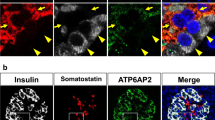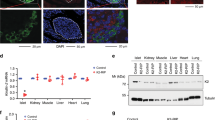Abstract
MafB, a member of the large Maf transcription factor family, is essential for the embryonic and terminal differentiation of pancreatic α- and β-cells. However, the role of MafB in the control of adult islet-cell proliferation remains unknown. Considering its oncogenic potential in several other tissues, we investigated the possible alteration of its expression in adult mouse β-cells under different conditions of proliferation. We found that MafB, in general silenced in these cells, was reexpressed in ∼30% of adaptive β-cells both in gestational female mice and in mice fed with a high-fat diet. Importantly, reactivated MafB expression was also observed in the early β-cell lesions and insulinomas that developed in β-cell specific Men1 mutant mice, appearing in >80% of β-cells in hyperplasic or dysplastic islets from the mutant mice >4 months of age. Moreover, MafB expression could be induced by glucose stimulation in INS-1 rat insulinoma cells. The induction was further reinforced following Men1 knockdown by siRNA. Furthermore, MafB overexpression in cultured βTC3 cells enhanced cell foci formation both in culture medium and on soft agar, accompanied with the increased expression of Cyclin B1 and D2. Conversely, MafB downregulation by siRNA transfection reduced BrdU incorporation in INS-1E cells. Taken together, our data reveal that Men1 inactivation leads to MafB reexpression in mouse β-cells in vivo, and provides evidence that deregulated ectopic MafB expression may have a hitherto unknown role in adult β-cell proliferation and Men1-related tumorigenesis.
This is a preview of subscription content, access via your institution
Access options
Subscribe to this journal
Receive 50 print issues and online access
$259.00 per year
only $5.18 per issue
Buy this article
- Purchase on Springer Link
- Instant access to full article PDF
Prices may be subject to local taxes which are calculated during checkout




Similar content being viewed by others
References
Artner I, Blanchi B, Raum JC, Guo M, Kaneko T, Cordes S et al. (2007). MafB is required for islet beta cell maturation. Proc Natl Acad Sci USA 104: 3853–3858.
Artner I, Le Lay J, Hang Y, Elghazi L, Schisler JC, Henderson E et al. (2006). MafB: an activator of the glucagon gene expressed in developing islet alpha- and beta-cells. Diabetes 55: 297–304.
Bertolino P, Tong WM, Galendo D, Wang ZQ, Zhang CX . (2003a). Heterozygous Men1 mutant mice develop a range of endocrine tumors mimicking multiple endocrine neoplasia type 1. Mol Endocrinol 17: 1880–1892.
Bertolino P, Tong WM, Herrera PL, Casse H, Zhang CX, Wang ZQ . (2003b). Pancreatic beta-cell-specific ablation of the multiple endocrine neoplasia type 1 (MEN1) gene causes full penetrance of insulinoma development in mice. Cancer Res 63: 4836–4841.
Chesi M, Bergsagel PL, Shonukan OO, Martelli ML, Brents LA, Chen T et al. (1998). Frequent dysregulation of the c-maf proto-oncogene at 16q23 by translocation to an Ig locus in multiple myeloma. Blood 91: 4457–4463.
Crabtree JS, Scacheri PC, Ward JM, McNally SR, Swain GP, Montagna C et al. (2003). Of mice and MEN1: insulinomas in a conditional mouse knockout. Mol Cell Biol 23: 6075–6085.
da Silva Xavier G, Sun G, Qian Q, Rutter GA, Leclerc I . (2010). ChREBP regulates Pdx-1 and other glucose-sensitive genes in pancreatic beta-cells. Biochem Biophys Res Commun 402: 252–257.
Eychène A, Rocques N, Pouponnot C . (2008). A new MAFia in cancer. Nat Rev Cancer 8: 683–693.
Fontaniere S, Duvillie B, Scharfmann R, Carreira C, Wang ZQ, Zhang CX . (2008). Tumour suppressor menin is essential for development of the pancreatic endocrine cells. J Endocrinol 199: 287–298.
Fontaniere S, Tost J, Wierinckx A, Lachuer J, Lu J, Hussein N et al. (2006). Gene expression profiling in insulinomas of Men1 beta-cell mutant mice reveals early genetic and epigenetic events involved in pancreatic beta-cell tumorigenesis. Endocr Relat Cancer 13: 1223–1236.
Huang K, Serria MS, Nakabayashi H, Nishi S, Sakai M . (2000). Molecular cloning and functional characterization of the mouse mafB gene. Gene 242: 419–426.
Hurt EM, Wiestner A, Rosenwald A, Shaffer AL, Campo E, Grogan T et al. (2004). Overexpression of c-maf is a frequent oncogenic event in multiple myeloma that promotes proliferation and pathological interactions with bone marrow stroma. Cancer Cell 5: 191–199.
Hussein N, Casse H, Fontaniere S, Morera AM, Asensio MJ, Bakeli S et al. (2007). Reconstituted expression of menin in Men1-deficient mouse Leydig tumour cells induces cell cycle arrest and apoptosis. Eur J Cancer 43: 402–414.
Karnik SK, Chen H, McLean GW, Heit JJ, Gu X, Zhang AY et al. (2007). Menin controls growth of pancreatic beta-cells in pregnant mice and promotes gestational diabetes mellitus. Science 318: 806–809.
Loffler KA, Biondi CA, Gartside M, Waring P, Stark M, Serewko-Auret MM et al. (2007). Broad tumor spectrum in a mouse model of multiple endocrine neoplasia type 1. Int J Cancer 120: 259–267.
Lu J, Herrera PL, Carreira C, Bonnavion R, Seigne C, Calender A et al. (2010). Alpha cell-specific Men1 ablation triggers the transdifferentiation of glucagon-expressing cells and insulinoma development. Gastroenterology 138: 1954–1965.
Merglen A, Theander S, Rubi B, Chaffard G, Wollheim CB, Maechler P . (2004). Glucose sensitivity and metabolism-secretion coupling studied during two-year continuous culture in INS-1E insulinoma cells. Endocrinology 145: 667–678.
Morito N, Yoh K, Fujioka Y, Nakano T, Shimohata H, Hashimoto Y et al. (2006). Overexpression of c-Maf contributes to T-cell lymphoma in both mice and human. Cancer Res 66: 812–819.
Morito N, Yoh K, Maeda A, Nakano T, Fujita A, Kusakabe M et al. (2011). A novel transgenic mouse model of the human multiple myeloma chromosomal translocation t(14;16)(q32;q23). Cancer Res 71: 339–348.
Mould AW, Duncan R, Serewko-Auret M, Loffler KA, Biondi C, Gartside M et al. (2007). Global expression profiling of murine MEN1-associated tumors reveals a regulatory role for menin in transcription, cell cycle and chromatin remodelling. Int J Cancer 121: 776–783.
Nishimura W, Kondo T, Salameh T, El Khattabi I, Dodge R, Bonner-Weir S et al. (2006). A switch from MafB to MafA expression accompanies differentiation to pancreatic beta-cells. Dev Biol 293: 526–539.
Nishimura W, Rowan S, Salameh T, Maas RL, Bonner-Weir S, Sell SM et al. (2008). Preferential reduction of beta cells derived from Pax6-MafB pathway in MafB deficient mice. Dev Biol 314: 443–456.
Nishizawa M, Kataoka K, Vogt PK . (2003). MafA has strong cell transforming ability but is a weak transactivator. Oncogene 22: 7882–7890.
Pechhold S, Stouffer M, Walker G, Martel R, Seligmann B, Hang Y et al. (2009). Transcriptional analysis of intracytoplasmically stained, FACS-purified cells by high-throughput, quantitative nuclease protection. Nat Biotechnol 27: 1038–1042.
Pouponnot C, Sii-Felice K, Hmitou I, Rocques N, Lecoin L, Druillennec S et al. (2006). Cell context reveals a dual role for Maf in oncogenesis. Oncogene 25: 1299–1310.
Rocques N, Abou Zeid N, Sii-Felice K, Lecoin L, Felder-Schmittbuhl MP, Eychene A et al. (2007). GSK-3-mediated phosphorylation enhances Maf-transforming activity. Mol Cell 28: 584–597.
Schnepp RW, Chen YX, Wang H, Cash T, Silva A, Diehl JA et al. (2006). Mutation of tumor suppressor gene Men1 acutely enhances proliferation of pancreatic islet cells. Cancer Res 66: 5707–5715.
Teta M, Rankin MM, Long SY, Stein GM, Kushner JA . (2007). Growth and regeneration of adult beta cells does not involve specialized progenitors. Dev Cell 12: 817–826.
van Stralen E, van de Wetering M, Agnelli L, Neri A, Clevers HC, Bast BJ . (2009). Identification of primary MAFB target genes in multiple myeloma. Exp Hematol 37: 78–86.
Wang H, Iynedjian PB . (1997). Modulation of glucose responsiveness of insulinoma beta-cells by graded overexpression of glucokinase. Proc Natl Acad Sci USA 94: 4372–4377.
Yang Y, Gurung B, Wu T, Wang H, Stoffers DA, Hua X . (2010). Reversal of preexisting hyperglycemia in diabetic mice by acute deletion of the Men1 gene. Proc Natl Acad Sci USA 107: 20358–20363.
Yang Y, Hua X . (2007). In search of tumor suppressing functions of menin. Mol Cell Endocrinol 265–266: 34–41.
Zhang C, Moriguchi T, Kajihara M, Esaki R, Harada A, Shimohata H et al. (2005). MafA is a key regulator of glucose-stimulated insulin secretion. Mol Cell Biol 25: 4969–4976.
Acknowledgements
We are grateful to Denis Ressnikoff for expert assistance of confocal microscopy, Jean-Michel Vicat and Martin Donnadieu for the maintenance of the mouse colonies, Dr Fabienne Rajas for help in high fat diet experiments, Pr. Jacques Philippe for Arx antibody, Dr Pierre Maechler for providing INS-1E line to M Cordier-Bussat. This study was supported by the Association pour la Recherche contre le Cancer (ARC), France, the Ligue contre le Cancer du Rhône and de la Loire, the MIRA program of Region Rhône-Alpes, National Science Foundation of China (NSFC30900700, 81170719, 30800537), and Science and Technology Commission of Shanghai Municipality (10140902900). J Lu and Z Hamze were the recipients of PhD-fellowship from ARC. J Lu was also the recipient of Shanghai Pujiang Program (10PJ1408900) and Shanghai New Excellent Youth Program (XYQ2011009).
Author information
Authors and Affiliations
Corresponding author
Ethics declarations
Competing interests
The authors declare no conflict of interest.
Additional information
Supplementary Information accompanies the paper on the Oncogene website
Rights and permissions
About this article
Cite this article
Lu, J., Hamze, Z., Bonnavion, R. et al. Reexpression of oncoprotein MafB in proliferative β-cells and Men1 insulinomas in mouse. Oncogene 31, 3647–3654 (2012). https://doi.org/10.1038/onc.2011.538
Received:
Revised:
Accepted:
Published:
Issue Date:
DOI: https://doi.org/10.1038/onc.2011.538
Keywords
This article is cited by
-
Microvesicle-associated and circulating microRNAs in diabetic dyslipidemia: miR-218, miR-132, miR-143, and miR-21, miR-122, miR-155 have biomarker potential
Cardiovascular Diabetology (2023)
-
Menin inhibition suppresses castration-resistant prostate cancer and enhances chemosensitivity
Oncogene (2022)
-
Determining oncogenic patterns and cancer predisposition through the transcriptomic profile in Mitchell–Riley syndrome with heterotopic gastric mucosa and duodenal atresia: a case report
Orphanet Journal of Rare Diseases (2021)
-
Growth arrest specific protein (GAS) 6: a role in the regulation of proliferation and functional capacity of the perinatal rat beta cell
Diabetologia (2013)



